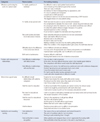Abstract
Purpose
The purpose of this study was to understand the meaning and nature of adaptation experiences among newly employed nurses in oncology ward.
Methods
The present study adopted a phenomenological method. The participants were 9 nurses employed for less than one year. Data were collected by using in-depth interviews. The question of this study was, "What are your experiences as a newly employed nurse in oncology?"
Results
150 significant statements were extracted from the data, and these were clustered into 5 main categories: a 'Difficulty in performing the work of a cancer ward', 'problems with interpersonal relationships', 'striving to be a good nurse', 'satisfaction and rewarding nursing', and 'adapted oneself to be a nurse'.
Conclusion
Newly employed nurses in oncology ward experienced and perceived feelings of difficulty in performing the work of a cancer ward, problems with interpersonal relationships, striving to be a good nurse, satisfaction and rewarding nursing, and adapting oneself to be a nurse. It is necessary to understand the experiences of new nurses, and to provide strategies that could help new nurses effectively adapt and find the meaning in their adaptation to work in oncology wards. Further research is needed on development of a program focusing on training to improve practicing ability and interpersonal relationships skills.
References
1. Moon IO, Lee MH. The Difference in Medical and nursing service satisfaction between internal and external customers. J Korean Acad Nurs Adm. 2002; 8(1):151–167.
2. Ha NS, Choi J. Nursing leadership style and job satisfaction, organizational commitment, turnover intent and the relationship between resea. J Korean Acad Nurs. 2002; 32(6):812–822.

3. Lee MS, Hahn SW. Original Articles : Effect of simulation-based practice on clinical performance and problem solving process for nursing students. J Korean Acad Soc Nurs Educ. 2011; 17(2):226–234.

4. Suh Y, Lee KW. Lived experiences of new graduate nurses. J Korean Acad Nurs Adm. 2013; 19(2):227–238.

5. Yoon SH, Kim BS. New graduate nurses' stress, stress coping, adaptation to work, and job satisfaction: change comparison by personality. J Korean Acad Nurs Adm. 2006; 12(3):491–500.
6. Hospital Nurses Association. Survey on the status of hospital nursing staffing. Accessed February 13, 2014. http://www.khna.or.kr.
7. Jones CB, Gates M. The costs and benefits of nurse turnover: a business case for nurses retention. Online J Issues Nurs. 2007; 12(3):5.
8. Aiken LH, Clarke SP, Sloane DM, Sochalski J, Silber JH. Hospital nurse staffing and patient mortality, nurse burnout, and job dissatisfaction. JAMA. 2002; 288(16):1987–1993.

9. Cimiotti JP, Aiken LH, Sloane DM, Wu ES. Nursing staffing, burnout, and health care-associated infection. Am J Infect Control. 2012; 40:486–490.
10. Scott ES, Martha KE, Melvin SS. New graduate nurse transitioning: necessary or nice? Appl Nurs Res. 2008; 21:75–83.

11. Min S, Kim HS, Ha YJ, Kim EA, Kim HY, Kim HJ, et al. The controlling effect of the self-efficacy in the job stress of hospital nurse on job satisfaction. Daehan J Bus. 2011; 24(1):1–21.
12. Yeh MC, Yu S. Job stress and intention to quit in newly graduated nurses during the first three months of work in Taiwan. J Clin Nurs. 2009; 18:3450–3460.

13. Seo YS, Kim YC. A study on factors affecting the turnover intention and job involvement of nurses. Bus Educ J. 2007; 12:151–172.
14. Beecroft PC, Dorey F, Wenten M. Turnover intention in new graduate nurses: a multivariate analysis. J Adv Nurs. 2008; 62(1):41–52.

15. Kim MR. Influential factors on turnover intention of nurses: the affect of nurse's organizational commitment and career commitment to turnover intention. J Korean Acad Nurs Adm. 2007; 13(3):335–344.
16. Yoon GS, Kim SY. Influences of job stress and burnout on turnover intention of nurses. J Korean Acad Nurs Adm. 2010; 16(4):507–516.

17. Halfer D, Graf E, Sullivan C. The organizational impact of a new graduate pediatric nurse mentoring program. Nurs Econ. 2008; 26(4):243–249.
18. Yun HM, Kim JS. An analysis of the factors affecting turnover intention of new nurses. Glob Health Nurs. 2012; 2(2):52–61.
19. Scott ES, Engelke KM, Swanson M. New graduate nurse transitioning: necessary or nice? Appl Nurs Res. 2008; 21(2):75–83.

20. Moon SH. Factors affecting the burnout of nurses in cancer wards and these in general wards [dissertation]. Seoul: Chung-Ang Univ.;2010.
21. Lee YS, Tae YS. The lived experience of the burnout of nurses working in oncology wards. Asian Oncol Nurs. 2012; 12(1):100–109.

22. Ji EO. A study on field adaptation of new nurses [dissertation]. Seoul: Ewha Womans Univ.;2009.
23. Hwang SY, Lee EJ, Na DM, Lee GS, Sun GS, Lee CS. The clinical experiences of newly-qualified nurses. J Korean Acad Nurs Adm. 2002; 8(2):261–271.
24. Park HS, Kim KN, Kang EH, Park SM. Lived adaptation experiences of new ICU nurses who are working in a newly established university hospital. J Korean Acad Fundam Nurs. 2011; 18(2):226–236.
25. Kim MY, Won JS. Adaptation to clinical experience by older graduate nurses who entered nursing after graduation in another field. J Korean Acad Fundam Nurs. 2007; 14(3):361–370.
26. Colaizzi FU. Psychological research as the phenomenologist view it. In : Valle RS, King M, editors. Existential phenomenological alternatives for psychology. New York: Oxford University Press;1978. p. 48–71.
27. Guba E, Lincoln Y. Fourth generation evaluation. Newbury Park: Sage;1989.
28. Park JH, Chun IS. The lived experience of newly employed nurses: phenomenological study. Qual Res. 2008; 9(2):99–110.
29. Yoon SH. A study on new graduate nurses' clinical experience of adaptation. J Korean Acad Nurs Adm. 2002; 8(1):55–72.




 PDF
PDF ePub
ePub Citation
Citation Print
Print



 XML Download
XML Download